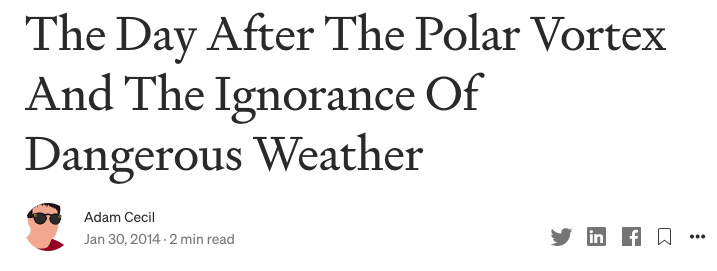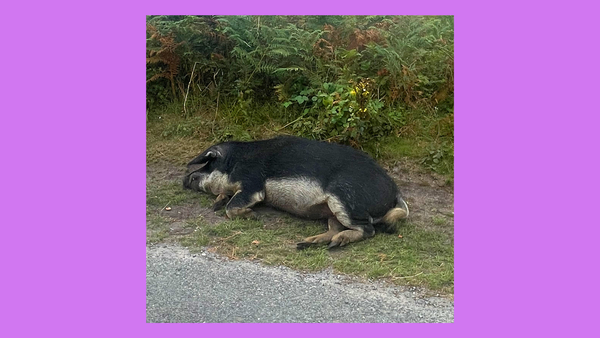Self (Media) Criticism
Let's read a seven-year-old NYU Local post by yours truly.

There is a lot of content cruft on the internet—articles and videos and posts that were made to be consumed in the moment, but unlike old newspaper articles on microfilm, they live forever side-by-side with today's news and opinion, as easily accessible as any other URL. As a small example, a seven-year-old post I wrote for my college's unofficial blog, NYU Local, got thirty views last week.

This article—a three paragraph musing on the term “polar vortex” and its connection to the 2004 climate disaster film The Day After Tomorrow—gets a spike in views in winter, specifically after major snow storms, cold spells, or uncharacteristic winter weather like we saw in Texas earlier this month. From what I remember, I was inspired to write this article because “polar vortex” was a popular buzzword during the early 2014 North American cold wave, and luckily for 2014 me—ostensibly an entertainment blogger—a polar vortex run amok was also the cause of New York freezing over in the then decade-old film The Day After Tomorrow.
This should be obvious given the above, but the article reeks of laziness. The length, for starters, is the bare minimum I could hand in, I can’t really make heads or tails of that headline, and I refer to Jake Gyllenhaal as “Jack Gyllenhaal,” bucking expectations by misspelling his first name instead of his last. The point and tone of it—we should use less energy or we’ll all get the death we deserve—is simplistic, particularly disappointing for me as an alumnus of two, count ‘em, two weekend programs on climate change activism in high school.

It is weird to imagine those thirty-odd viewers stumbling upon this old article and thinking it represents my writing now, or even the editorial standards of NYU Local at large. But I do love it as a time capsule of 2014. NYU Local gave me my first real taste of writing for a public audience, at a time when Gawker and The Awl were at their height, and made me think that maybe I could do this for a living. I won’t rehash the entire history of the digital media industry, but things didn’t necessarily work out that way for a lot of folks and outlets. One reason why there’s excitement about Substack, where this newsletter is hosted, is that it harkens back to that era when writers could write freely and get paid for doing so. I doubt that I’ll ever make a full-time gig out of a newsletter, but I can hope that maybe in seven years, thirty-odd people read this post after a snowstorm.




